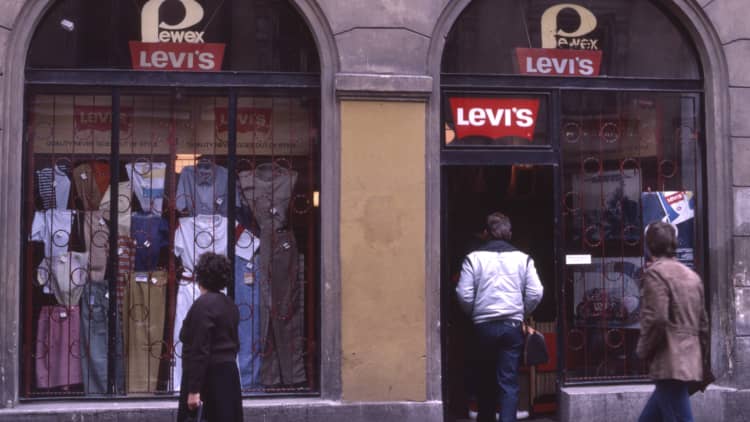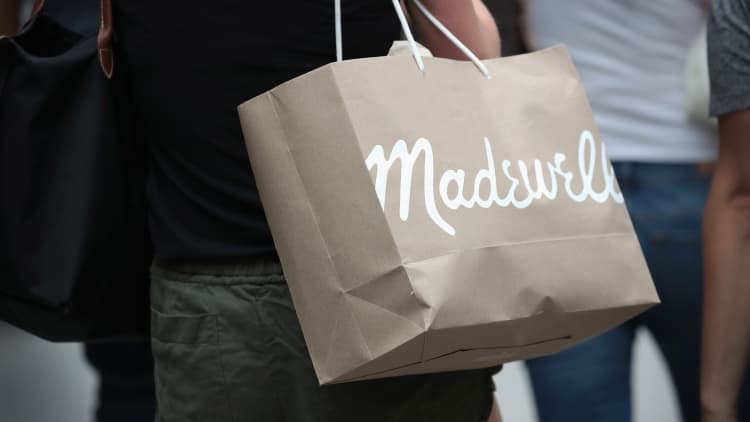Madewell's planned IPO may finally break it free of struggling parent J.Crew, but the denim maker will then be alone to fight big-name denim competitors like Levi Strauss, Wrangler, and American Eagle.
The company, which hasn't announced a date for its initial public offering, makes apparel popular with Gen Z and young millennials. It reported $614 million in sales in 2018, up 32% from 2017. Its active customers have also grown 30% from 2017 to 2.6 million, according to a recent filing.
Madewell, however, faces stiff competition from the abundance of similar retailers with overlapping offerings, innovative denim competitors, and a growing secondhand market.
Neil Saunders, managing director of GlobalData Retail, said that even though many of the brands competing with Madewell are smaller, the threat is that there are so many — and Madewell needs to keep an eye on all of them.
"The problem is that when you have a brand like Madewell, the type of customers that shop there are more fashion-focused and do shop around and look at other brands, and find other things in other niche shops," said Saunders. "So for Madewell, it's not really about big competition, it's about what these niche brands are doing and having the ability to take market share because of that innovation."
Third time's a charm?
The retailer brands itself as a denim company with a mission to "get more butts in our jeans." But if Madewell goes public in 2019, it would be the third denim company to do so. Blue jeans company Levi Strauss began offering its shares to the public in March, after being private for 34 years. In May, VF Corp spun off its jeanswear brands Wrangler, Lee, and Rock & Republic into a newly public company called Kontoor Brands.
American Eagle already claims the most share of the jeans market among 15- to 25-year-olds and ranks second in all jeans brands, behind Levi's, according to data from NPD. American Eagle also recently launched a curvy fit style of jeans, designed for women with a smaller waist and bigger hips. Jefferies analyst Randal Konik wrote in an analyst note that the launch will "fortify AEO's already industry-leading position in denim." Earlier this year, Madewell also launched a curvy style and offers up to size 24 online. Abercrombie & Fitch recently introduced its own curvy jeans collection, and Konik said he likes that "ANF is opting to invest in an underserved category."
But Shawn Carter, a professor at the Fashion Institute of Technology, points out that in fiscal 2018, only 19% of Madewell's revenue came from jeans. Most of it was generated from what the company has deemed "everything you wear with jeans" and "lifestyle" products. It includes T-shirts, jackets, footwear, bags and dresses.
She said that in those categories, Madewell might face competition from Urban Outfitters and its Free People and Anthropologie brands, even though Urban is "a little funkier" and Anthropologie's target customer may be a little older.
According to Saunders, the brands also tend to be located in the same areas.
"Where you find Free People, you often also find a Madewell. There tends to be a degree of overlap between them, which might make them compete head on," he said.
Other, smaller brands that have similar aesthetics include 7 For All Mankind, which also focuses on denim, Aritzia, which also targets millennials, and Everlane, which sells similar leather bags and shoes with a sustainable mission.
Madewell did not immediately respond to requests for comment.
The threat from secondhand sellers
Carter also noted that Madewell is known for sustainability and higher-quality items.

"The same customer who will buy Madewell because it lasts long will be your environmentally conscious consumer, who understands that there are different ways to recycle and resell their clothing if they choose to," she said. More women than ever, or 64%, have bought or are willing to buy secondhand products, according to a report from reseller ThredUp. The secondhand apparel market is expected to reach $51 billion by 2023.
But the premium quality of the clothing might mean that the growing secondhand trend is an unexpected headwind for Madewell.
"Their products are exactly the kind of thing people will buy more secondhand," said Saunders. "Whereas if you look at America Eagle it's cheaper, run-of-the-mill, why would you bother buying it secondhand? So I certainly think Madewell has to keep an eye on the secondhand market and has to think about its response to that more, and premium middle brands also have to do the same sort of things."
That's not to say that retailers shouldn't also be watching out for Madewell, especially now that it's free from its parent company.
"Madewell has been the more successful part of J.Crew, but it's really been overshadowed by the problems at J.Crew and the structure of the group. Getting out from under that shadow is going to be very helpful for the Madewell business," Saunders said. "The access to capital means Madewell can ramp up expansion, open more stores, have more marketing and more customer acquisition, so that's going to be very much a threat to other players."



